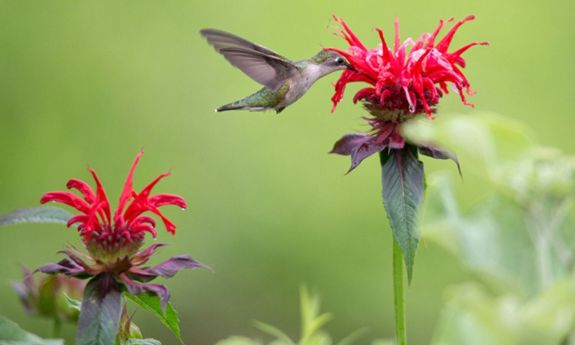Know Your Pollinators. They Might Just Save Your Gardens.
During Pollinator Week, Duke Gardens experts showcase the ‘backbone’ of our ecosystem

Throughout the week there will be garden talks, science projects, videos and other items designed to promote understanding of the important role played by pollinators and what people can do in their own yards and gardens to support them and build healthy ecosystems. A Duke Gardens Pollinator Week website provides complete information.
All programs will start at the Doris Duke Center. No registration is required, except for "Plants & Pollinators in the Pocket Prairie."
POLLINATOR WEEK EVENTS
Power of Pollinator Plants Walking Tour, Monday, Tuesday, Thursday and Friday, June 17, 18, 20 & 21, 10-11 a.m. Join Duke Gardens horticulturists as they highlight a diverse array of beautiful and beneficial pollinator-friendly flowers throughout Duke Gardens.
Parking Lot Pocket Prairie Walk, Tuesday, June 18, 9-10 a.m. Visit our prairie in a parking lot! Maegan Luckett, horticulturist of the Blomquist Garden of Native Plants, will guide visitors to the Duke Gardens pocket prairie project in a nearby parking lot to highlight prairie plants thriving in built environments.
The Backyard Wildlife Garden in the Blomquist, Thursday, June 20, 4:30-5:15 p.m. Explore the recently reimagined backyard wildlife garden in the Blomquist Garden of Native Plants with the garden’s designer, curator Annabel Renwick, and learn more about native pollinator plants that are recommended for home gardens, given their ornamental and environmental value.
Pollinator Collaborative Science, Friday, June 21, 12-12:45 p.m. Collaborative science (also called citizen science or community science) is when people who aren't professional scientists help collect and analyze information used to answer research questions that can't be studied without a large group of people. Kati Henderson, university and community partnerships coordinator at Duke Gardens, will demonstrate how to use the iNaturalist app for pollinator data collection and highlight places at Duke Gardens that attract interesting pollinators. We'll also share things to look for and photograph when observing and identifying pollinators.
Bees & Pollinators at Duke Gardens, Thursday, June 20, 1-1:45 p.m. Join us for this special opportunity to meet Megan Brown and Nick Schwab, Duke Gardens’ resident beekeepers, in the Charlotte Brody Discovery Garden, and learn how we care for bees and pollinators throughout the Gardens.
Plants & Pollinators in the Pocket Prairie, Saturday, June 22, 9-11 a.m. (registration required for this event; info here).Did you know a prairie can grow in a parking lot? Southeastern native prairie plants can be an attractive, low-maintenance alternative to sod in underutilized urban areas such as parking lots. Additionally, unlike sod, these pocket prairies can also be beneficial to pollinators such as birds and butterflies. Join Maegan Luckett, horticulturist of the Blomquist Garden of Native Plants, for a visit to a Duke Gardens pocket prairie project in a nearby parking lot for a show and tell demonstration of how ecologically beneficial prairies can coexist with a built environment. You’ll leave with a plant list and an appreciation for the power of prairie plants.
COLLABORATIVE SCIENCE
There’s plenty of opportunities for people to engage in citizen science projects to document valuable information about pollinator behavior. Among the ongoing projects are the Urban Bee Climate Project, the Bumble Bee Watch and iNaturalist.
VIDEOS
WANT TO KNOW MORE?
The Duke Gardens website also offers additional resources including web columns from Gardens experts on how to build a pollinator house, creating a prairie garden and care for beebalm plants. Read more on the website.